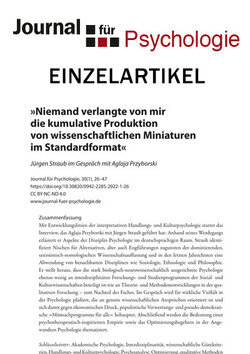22 Seiten, PDF-E-Book
Erschienen: Juni 2022
Bestell-Nr.: 34079
https://doi.org/10.30820/0942-2285-2022-1-26
abonnieren
Jürgen Straub & Aglaja Przyborski
»Niemand verlangte von mir die kumulative Produktion von wissenschaftlichen Miniaturen im Standardformat« (PDF)
Jürgen Straub im Gespräch mit Aglaja Przyborski
Sofortdownload
Dies ist ein E-Book. Unsere E-Books sind mit einem personalisierten Wasserzeichen versehen,
jedoch frei von weiteren technischen Schutzmaßnahmen (»DRM«).
Erfahren Sie hier mehr zu den Datei-Formaten.
Mit Entwicklungslinien der interpretativen Handlungsund Kulturpsychologie startet das Interview, das Aglaja Przyborski mit Jürgen Straub geführt hat: Anhand seines Werdegangs erläutert er Aspekte der Disziplin Psychologie im deutschsprachigen Raum. Straub identifiziert Nischen für Alternativen, aber auch Engführungen zugunsten der dominierenden, szientistisch-nomologischen Wissenschaftsauffassung und in den letzten Jahrzehnten eine Abwendung von benachbarten Disziplinen wie Soziologie, Ethnologie und Philosophie. Er stellt heraus, dass die stark biologisch-neurowissenschaftlich ausgerichtete Psychologie ebenso wenig an interdisziplinären Forschungsund Studienprogrammen der Sozialund Kulturwissenschaften beteiligt ist wie an Theorieund Methodenentwicklungen in der qualitativen Forschung – zum Nachteil des Faches. Im Gespräch wird für wirkliche Vielfalt in der Psychologie plädiert, die an genuin wissenschaftlichen Ansprüchen orientiert ist und sich damit gegen ökonomischen Druck, populistische Verwertungsund pseudo-demokratische »Mitmachprogramme für alle« behauptet. Abschließend werden die Bedeutung einer psychotherapeutisch-inspirierten Empirie sowie das Optimierungsbegehren in der Angewandten Psychologie thematisiert.
Abstract:
Aglaja Przyborski’s interview with Jürgen Straub starts with the development of interpretative action and cultural psychology: Based on his career, he explains aspects of the discipline of psychology in the German-speaking world. Straub identifies niches for alternatives, but also a narrowing in favor of the dominant, scientistic-nomological view of science and, in recent decades, a turning away from neighboring disciplines such as sociology, ethnology and philosophy. He emphasizes that psychology, which has a strong biological-neuroscientific orientation, is no more involved in interdisciplinary research and study programs in the social and cultural sciences than it is in theory and method developments in qualitative research – to the detriment of the discipline. In the conversation, a plea is made for real diversity in psychology, oriented towards genuinely scientific claims and thus asserting itself against economic pressure, populist exploitation and pseudo-democratic »participation programs for all«. Finally, the importance of a psychotherapeutic empiricism as well as the desire for optimization in applied psychology are discussed.
Abstract:
Aglaja Przyborski’s interview with Jürgen Straub starts with the development of interpretative action and cultural psychology: Based on his career, he explains aspects of the discipline of psychology in the German-speaking world. Straub identifies niches for alternatives, but also a narrowing in favor of the dominant, scientistic-nomological view of science and, in recent decades, a turning away from neighboring disciplines such as sociology, ethnology and philosophy. He emphasizes that psychology, which has a strong biological-neuroscientific orientation, is no more involved in interdisciplinary research and study programs in the social and cultural sciences than it is in theory and method developments in qualitative research – to the detriment of the discipline. In the conversation, a plea is made for real diversity in psychology, oriented towards genuinely scientific claims and thus asserting itself against economic pressure, populist exploitation and pseudo-democratic »participation programs for all«. Finally, the importance of a psychotherapeutic empiricism as well as the desire for optimization in applied psychology are discussed.
Paul S. Ruppel & Günter Mey S. 3–5Editorial (PDF)
Thomas Slunecko & Gerhard Benetka S. 6–25Über Psychologiekritik (PDF)
Thomas Slunecko und Gerhard Benetka im GesprächJürgen Straub & Aglaja Przyborski S. 26–47»Niemand verlangte von mir die kumulative Produktion von wissenschaftlichen Miniaturen im Standardformat« (PDF)
Jürgen Straub im Gespräch mit Aglaja PrzyborskiAlexandre Métraux & Alexander Nicolai Wendt S. 48–68Zur phänomenologischen Orientierung in der Psychologie (PDF)
Alexandre Métraux im Gespräch mit Alexander NicolaiWendtJanina Loh & Ralph Sichler S. 69–87Das Humane oder Posthumane in der Psychologie? (PDF)
Janina Loh und Ralph Sichler im GesprächFritz Schütze, Paul S. Ruppel & Pradeep Chakkarath S. 88–110»Dann stellten wir aber fest: Da sind diese Lebensgeschichten« (PDF)
Fritz Schütze im Gespräch mit Paul S. Ruppel und Pradeep ChakkarathHarald Welzer & Günter Mey S. 111–130»Scheiße machen wir nicht!« (PDF)
Harald Welzer und Günter Mey im Gespräch
Thomas Slunecko & Gerhard Benetka S. 6–25Über Psychologiekritik (PDF)
Thomas Slunecko und Gerhard Benetka im GesprächJürgen Straub & Aglaja Przyborski S. 26–47»Niemand verlangte von mir die kumulative Produktion von wissenschaftlichen Miniaturen im Standardformat« (PDF)
Jürgen Straub im Gespräch mit Aglaja PrzyborskiAlexandre Métraux & Alexander Nicolai Wendt S. 48–68Zur phänomenologischen Orientierung in der Psychologie (PDF)
Alexandre Métraux im Gespräch mit Alexander NicolaiWendtJanina Loh & Ralph Sichler S. 69–87Das Humane oder Posthumane in der Psychologie? (PDF)
Janina Loh und Ralph Sichler im GesprächFritz Schütze, Paul S. Ruppel & Pradeep Chakkarath S. 88–110»Dann stellten wir aber fest: Da sind diese Lebensgeschichten« (PDF)
Fritz Schütze im Gespräch mit Paul S. Ruppel und Pradeep ChakkarathHarald Welzer & Günter Mey S. 111–130»Scheiße machen wir nicht!« (PDF)
Harald Welzer und Günter Mey im Gespräch

